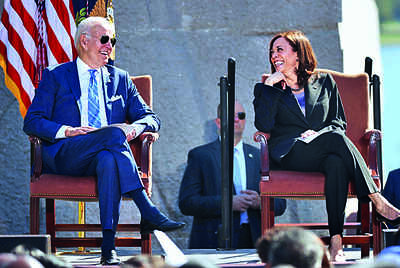Kamala Harris’s forthcoming campaign memoir 107 Days is both a chronicle of her compressed 2024 presidential run and a searing account of what she calls the indifference, neglect, and at times sabotage she endured inside Joe Biden’s White House. Far from the lawyerly caution that once defined her public persona, the Harris of these pages is blunt, candid, occasionally biting—and unafraid to call out the very administration she served as vice president.
Nine minutes too late
One of the book’s most striking anecdotes comes from July 2024, when Harris watched Biden’s Oval Office address announcing his withdrawal from the race. Though the moment was meant to hand her the mantle, Harris notes that her name appeared only nine minutes into an 11-minute speech. “That was it,” she writes, a telling slight that for her symbolised the president’s reluctance to elevate her role.
Silence in the face of attacks
Harris catalogues how, when conservative media mocked her laugh, her voice, her dating history, or dismissed her as a “DEI hire,” the White House offered little public defence. Her actual résumé—two-term district attorney, California attorney general leading the second-largest justice department in the US, and senator for 40 million people—was rarely deployed to counter these narratives. Her chief of staff Lorraine Voles, Harris says, had to fight constantly for visibility: “She’s not going to stand there like a potted plant. Give her two minutes of remarks. Have her introduce the president.” Yet, she claims, Biden’s expansive comms team prioritised protecting him while leaving her exposed.
Fuel on hostile narratives

The vice president accuses Biden’s aides of allowing negative portrayals to metastasise. Chief among them was the claim of a “chaotic office” and high staff turnover. Harris calls this no different from any first year in a new White House, intensified by the scrutiny of being the first woman vice president. But she says the president’s team not only failed to challenge the caricature—it at times fed it.
The “French accent” flap
She singles out her 2021 trip to Paris, where she helped repair ties with Emmanuel Macron after the AUKUS submarine spat. At the Pasteur Institute, she joked about “the Plan” with exaggerated air quotes. Fox News and the New York Post claimed she had faked a French accent. Harris calls this “total nonsense,” but says the White House seemed content to let the story crowd out her success in thawing relations with France.
Stalled on migration
Harris writes with particular frustration about her assignment to tackle “root causes” of migration from Central America. She details billions in private investment secured, 70,000 jobs created, and millions connected to banking services. Yet when she sought to publicise the progress, the West Wing told her to wait for more data. In the meantime, Republicans branded her the “border czar” and she bore the blame for migration challenges that had vexed every administration.
Gaza speech backlash
Perhaps the most revealing episode comes from Selma, Alabama, where Harris delivered a widely praised speech on the humanitarian crisis in Gaza—explicitly vetted and approved by the National Security Council. The address went viral for its balance of empathy and firmness, but she writes that the West Wing castigated her for delivering it “too well.” Success, she suggests, was viewed as zero-sum: if she shone, Biden dimmed.
A pattern of sidelining
Harris describes an administration where even allies resisted her visibility. She says the White House often denied her speaking slots, buried her achievements, and allowed right-wing caricatures to dominate. At times, she claims, aides added “fuel to negative narratives” rather than protecting the vice president.
Recklessness at the top
On Biden himself, Harris is careful but unsparing. She describes her loyalty, but also calls the decision to leave the re-election bid solely to him and his family “recklessness.” At 81, she writes, Biden was “a smart guy with long experience” but often tired, which contributed to his debate debacle. She insists it was not incapacity but fatigue, exacerbated by heavy travel. Still, she adds: “As loyal as I am to President Biden, I am more loyal to my country.”
What the memoir reveals
107 Days is more than a campaign diary. It is Harris’s argument that the White House treated her as a threat, not an asset, during a presidency where Biden’s age made her role unusually important. By highlighting her record on reproductive rights, migration, and foreign policy, while exposing how she was undermined internally, Harris casts herself as both victim and survivor—an outsider on the inside.The memoir will no doubt fuel partisan fire. For Democrats, it poses hard questions about whether the administration mismanaged its own historic vice president. For Republicans, it offers ready-made talking points about division at the top. But for Harris, it is also a calculated act: reclaiming her narrative.. Go to Source




)